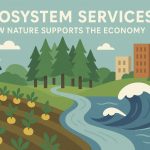Ecotourism is more than just a trendy way to travel — it’s a movement toward responsible tourism that aims to protect nature, benefit local communities, and educate visitors. In an age of environmental crisis and over-tourism, ecotourism offers a powerful way to explore the world while giving back to it.
What Is Ecotourism?
Ecotourism is defined as responsible travel to natural areas that conserves the environment, supports local people, and involves education and interpretation. Unlike traditional tourism, which often exploits nature and culture, ecotourism seeks to minimize impact and maximize positive contributions.
Key principles of ecotourism include:
- Environmental conservation
- Cultural respect and involvement
- Community empowerment
- Educational experiences for visitors
How It Works in Practice
Ecotourism can take many forms:
- Guided hikes in national parks led by local rangers
- Wildlife watching tours that follow ethical standards
- Community-based lodges that employ and are run by local residents
- Marine reserves that limit access to preserve coral reefs
- Educational trips to learn about endangered species or ecosystems
These experiences are designed to be low-impact, with small groups, eco-friendly transportation, and sustainable accommodations.
Why Ecotourism Matters
- Conservation Funding
Entrance fees and tourism revenue help fund national parks, wildlife reserves, and environmental programs. - Economic Benefits for Locals
Ecotourism supports jobs in rural areas, from guides and cooks to artisans and farmers. - Cultural Preservation
It encourages the sharing and protection of local traditions, crafts, and stories. - Education and Awareness
Visitors leave with a deeper understanding of nature and sustainability, influencing future behavior and advocacy. - Alternative to Mass Tourism
By promoting small-scale, ethical travel, ecotourism helps reduce overcrowding, pollution, and cultural erosion.
Challenges to Address
- Greenwashing: Some operators use the term “ecotourism” for marketing without following its values
- Carrying capacity: Even low-impact tourism can damage ecosystems if not carefully managed
- Accessibility: Ecotourism experiences can be expensive or remote
To be truly effective, ecotourism must be transparent, locally led, and ecologically sound.
The Future of Sustainable Travel
As more travelers seek meaningful and ethical experiences, ecotourism is becoming a growing force in the global tourism industry. When done right, it’s a win-win: nature thrives, communities grow, and visitors gain memories that inspire long-term change.
Glossary
- Ecotourism — responsible travel that conserves the environment and benefits local communities
- Greenwashing — misleading marketing that falsely claims a product or service is environmentally friendly
- Carrying capacity — the maximum number of visitors an ecosystem can sustain without damage


